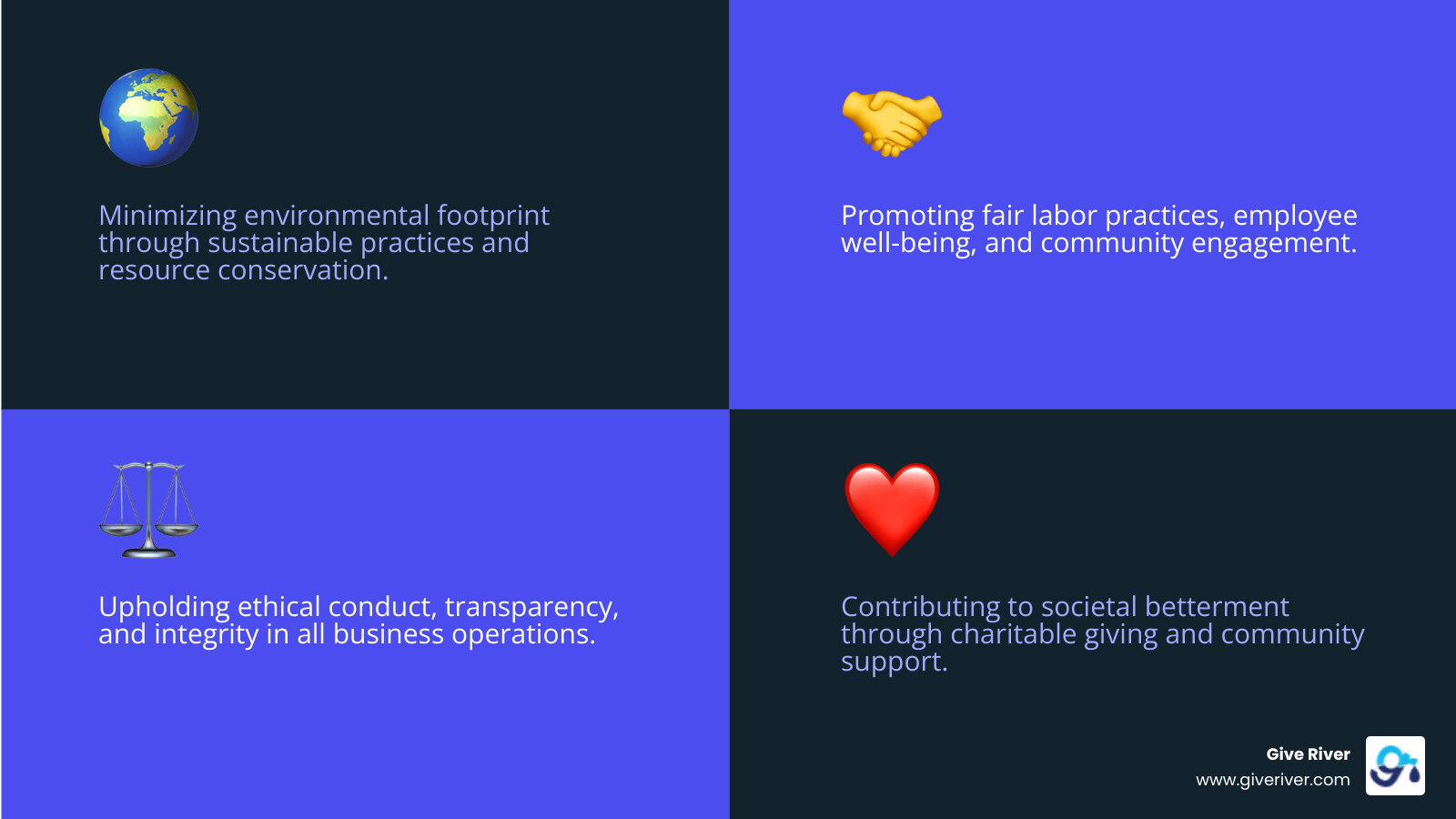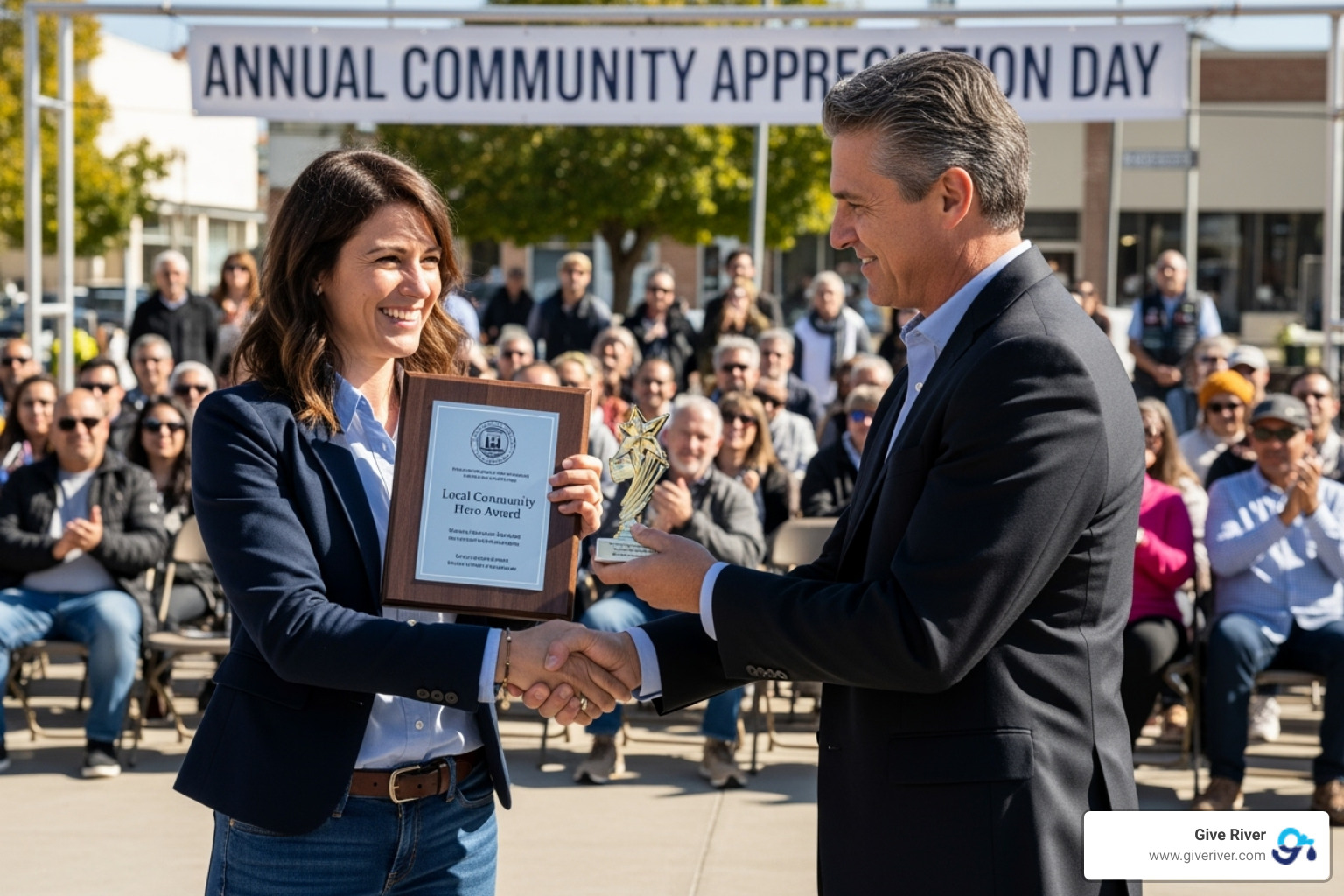Beyond the Bottom Line: Real-World CSR Success Stories for Small Businesses
Unlock the power of Small business CSR! Boost profits, attract talent, and build trust with real-world examples and a practical roadmap.

Why CSR is No Longer Just for Corporate Giants
Small business CSR is the practice of integrating ethical, social, and environmental concerns into a business's operations. It extends beyond profit-making to positively impact society, allowing small businesses to make a difference in their communities and align values with actions. This matters because modern consumers and employees expect social responsibility from businesses of all sizes.
- 77% of consumers want to buy from companies they feel are making the world better.
- 92% of consumers are more likely to trust a company that accepts Corporate Social Responsibility (CSR).
- Over half (53%) of U.S. and Canadian small businesses now stand by a social mission.
This isn't just a trend; it's a fundamental shift. Embracing CSR builds trust, customer loyalty, and brand reputation. It demonstrates a commitment to values beyond the bottom line, resonating with today's conscious customers.
I'm Meghan Calhoun, Co-Founder of Give River. My passion is helping companies focused on Small business CSR build happier, healthier, high-performing teams by integrating social purpose into their culture.

While "Corporate Social Responsibility" might sound reserved for large corporations, it's vital for small businesses. CSR allows you to forge deeper community connections, stand out in a crowded market, and attract passionate talent. At its core, CSR is about accountability for your impact on employees, stakeholders, and the community. This holistic approach defines a responsible business. If you're curious to dive deeper, we've explored What is CSR and provided a comprehensive CSR Definition on our blog.
The Tangible Returns of Small Business CSR: Benefits & Real-World Examples

Small business CSR isn't just about feeling good—it's a smart strategy that delivers measurable benefits, strengthening your brand, attracting talent, and improving your bottom line.
Let's explore the powerful benefits:
Improved Brand Reputation and Consumer Trust: With 92% of consumers more likely to trust a company that accepts CSR, showing you care about social and environmental well-being builds a reputation as a responsible, ethical business that attracts customers who share your values.
Increased Customer Loyalty and Willingness to Pay More: Today's consumers are thoughtful spenders. Studies show 55% of customers will pay more for products from socially responsible companies. When customers see your positive impact, they feel a stronger connection, leading to lasting loyalty.
Attracting and Retaining Top Talent: The modern workforce seeks purpose, with 79% of Millennials considering CSR when choosing an employer. A strong CSR program attracts passionate, engaged employees, reducing turnover. While employee recognition platforms like Bonusly or Kudos are popular for peer-to-peer praise, Give River offers a different approach by integrating social purpose directly into your culture. Our platform uniquely gamifies generosity and community impact, allowing employees to turn recognition into real-world charitable donations, fostering deeper engagement and a stronger sense of purpose.
Operational Cost Savings and Innovation: Sustainable practices like reducing waste, optimizing energy, and ethical sourcing can lower overheads. Thinking sustainably also sparks innovation, pushing you to find more efficient ways of operating.
Increased Access to Funding and Partnerships: A commitment to Small business CSR can open doors to new funding, grants, and collaborations with like-minded organizations, giving you a competitive edge.
The growing importance of CSR is clear: 70% of companies planned to increase investment in social responsibility in 2020. Already, 67% of small businesses practice sustainability, and 54% allow customers to donate to charity at checkout. For more inspiration, check out other Examples of Corporate Social Responsibility.
Boosting Your Brand and Bottom Line Through Environmental Stewardship
One of the most impactful ways for Small business CSR is through environmental stewardship. It's about making small, consistent changes that add up.
Sustainability initiatives can be simple, like adding recycling bins, reducing operational waste, or switching to energy-saving light bulbs. Using eco-friendly packaging helps the planet and appeals to consumers who prioritize environmental values.
For waste reduction, a local bakery could partner with a food rescue group to donate unsold pastries, while an IT firm could implement a strict e-waste recycling program. For energy efficiency and ethical sourcing, conduct energy audits to reduce consumption and ensure your supply chain uses fair labor and sound environmental practices. This transparency builds customer trust.
When it comes to green marketing for small businesses, honesty is key. Avoid "greenwashing" by sharing facts and figures about your real impact. This authenticity strengthens your brand and attracts eco-conscious customers.
Building Unbreakable Community Bonds and Customer Loyalty

Beyond environmentalism, Small business CSR thrives on community engagement. Investing in your local community builds powerful, two-way relationships.
Community involvement and local partnerships can mean sponsoring school events or teaming up with non-profits. For instance, a café could donate surplus food to a local shelter, or a hardware store could sponsor a youth sports team. These actions build goodwill and community spirit.
Volunteering and philanthropy are also highly impactful. Encourage staff to volunteer, perhaps by organizing team days or offering paid Volunteer Time Off (VTO). Philanthropy can be as simple as donating a portion of sales to a local charity, an action 54% of small businesses already take.
Engage in strategic giving by aligning donations with your business values. A bookstore might donate books to schools, or a pet supply store could support animal shelters, strengthening brand identity. At Give River, our platform facilitates Community Impact Initiatives and makes Charitable Giving at Work seamless, fostering a culture of generosity.
Fostering an Unbeatable Culture with Employee-Centric Small Business CSR
An impactful Small business CSR strategy starts from within. Prioritizing your team's well-being and engagement creates a meaningful and productive culture.
Employee well-being and engagement involves fostering a positive, inclusive environment with work-life balance and professional development. Caring for employees leads to higher productivity and lower turnover.
Implement workplace giving and Volunteer Time Off (VTO). Workplace Giving Programs let employees donate via payroll, and Company Matching Gift Programs can double their impact. VTO empowers employees to participate in community service, building pride and connection. Ethical labor practices are also a core pillar, ensuring fair wages, safe conditions, and respect for all.
How Give River’s platform gamifies good deeds: We take employee engagement a step further by gamifying good deeds. Unlike platforms such as Bonusly or Kudos that focus primarily on peer-to-peer recognition, Give River integrates charitable impact directly into your team culture. Employees earn points for positive actions and direct them as donations to their chosen charities. This unique, gamified experience builds stronger, purpose-driven teams and fosters a culture of community impact. By empowering your employees' generosity, you cultivate a loyal and motivated workforce.
Your Roadmap to Impact: Implementing and Measuring Your CSR Strategy

Now that you understand the benefits of Small business CSR, how do you make it happen? You don't need a massive budget or a dedicated department. The most successful CSR programs start small, stay authentic, and build momentum over time, becoming part of the business's DNA. What you need is a thoughtful approach that aligns with your values and grows with your business.
Getting Started: Integrating CSR into Your Business DNA
Effective Small business CSR flows naturally from your business identity, rather than being an add-on.
Aligning CSR with your company values is the first step. If your bakery uses local ingredients, your CSR could focus on supporting local farmers. This alignment ensures your efforts are genuine and sustainable.
Starting small and involving your employees is crucial. Your team has valuable insights into community needs and creative solutions. Involving them turns them into invested advocates.
Setting clear goals and communicating your progress transforms intentions into impact. Define specific outcomes, like "Reduce office waste by 30% this year," and share your progress to build trust and accountability.
The path forward can be broken into manageable steps: 1) Assess your current practices. 2) Identify stakeholder and community needs. 3) Set measurable goals. 4) Develop a realistic action plan. 5) Communicate the vision and involve everyone.
For deeper insights, we've explored What are Three Ways Businesses Demonstrate Corporate Social Responsibility on our blog.
Overcoming Problems and Measuring What Matters in Small Business CSR
Common challenges like time constraints, budget concerns, and lack of expertise are real but not impossible.
To manage time and cost limitations, start with initiatives that align with your existing operations, like improving recycling or partnering with local nonprofits. A phased approach works well; start with one quarterly volunteer event and expand gradually.
Strategic partnerships multiply your impact. Team up with other local businesses or established nonprofits. Platforms can also streamline your efforts. While platforms like Bonusly and Kudos focus on internal recognition, Give River uniquely integrates external charitable impact into your culture, making it easier to manage and more engaging for purpose-driven teams.
Measuring your CSR impact doesn't have to be complex. Track key metrics like employee satisfaction, turnover rates, and volunteer participation. Monitor customer feedback and positive reviews related to your community involvement. Also, note operational gains like reduced waste or lower energy use.
For those ready to go further, B Corp certification offers a comprehensive framework for evaluating social and environmental performance.
The Future of CSR: Aligning Purpose with Long-Term Growth
The Small business CSR landscape is evolving. ESG considerations are becoming standard, and younger generations expect authentic commitment to social responsibility.
Authenticity remains paramount. Consumers and employees can spot superficial efforts. They demand consistent action that aligns with your stated values, not just occasional charitable gestures.
Successful small businesses embed purpose into their long-term growth strategy, using CSR to drive innovation, engagement, and loyalty. They build resilience by creating deeper connections with employees, customers, and their communities.
At Give River, we help small businesses harness this power. Our platform makes community impact an integral, engaging part of your culture by gamifying generosity. We believe a culture rooted in gratitude and impact builds happier teams and more successful businesses.
Ready to transform your workplace and make a lasting difference? Explore our Solutions for Charitable Impact to build a legacy beyond the bottom line.




